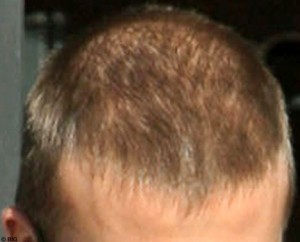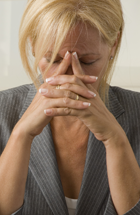Going bald is a fact of life for millions of men. But there are now treatments available that can stop further hair loss and promote regrowth.
06.08.2009 in Uncategorized
Adults lose about 10,000 scalp hairs each and every day. Hair normally lives for around five years. With male pattern baldness these hairs do not always get replaced and gradually bald areas appear. This process can however take a long time and the age at which you start to lose hair does not necessarily provide any clues as to how long it will be until you define yourself as bald. There are a number of reasons why men start to go bald, but if you are a man between the ages of about 20 to 45 and you start to lose scalp hair, then the chances are 95 per cent certain that you are experiencing male pattern baldness. As the term suggests, male pattern baldness follows a typical sequence or pattern.

The normal cycle of hair growth and loss
The normal cycle of hair growth lasts for 2 to 6 years. Each hair grows approximately 1 centimeter (less than half an inch) per month during this phase. About 90 percent of the hair on your scalp is growing at any one time. About 10 percent of the hair on your scalp, at any one time, is in a resting phase. After 2 to 3 months, the resting hair falls out and new hair starts to grow in its place. It is normal to shed some hair each day as part of this cycle. However, some people may experience excessive (more than normal) hair loss. Hair loss of this type can affect men, women and children.
Excessive Hair Loss Reasons
A number of things can cause excessive hair loss. For example, about 3 or 4 months after an illness or a major surgery, you may suddenly lose a large amount of hair. This hair loss is related to the stress of the illness and is temporary. Hormonal problems may cause hair loss. If your thyroid gland is overactive or under active, your hair may fall out. Certain infections can cause hair loss. Fungal infections of the scalp can cause hair loss in children. Finally, hair loss may occur as part of an underlying disease, such as lupus or diabetes.
The common baldness
The term “common baldness” usually means male-pattern baldness, or permanent-pattern baldness. Male-pattern baldness is the most common cause of hair loss in men. Men who have this type of hair loss usually have inherited the trait. Men who start losing their hair at an early age tend to develop more extensive baldness. In male-pattern baldness, hair loss typically results in a receding hair line and baldness on the top of the head.
Male Pattern Baldness
The male pattern baldness form of androgenic alopecia accounts for more than 95% of hair loss in men. By age 35, two-thirds of UK and EU men will have some degree of appreciable hair loss and by age 50 approximately 85% of men have significantly thinning hair. About 25% of men who suffer from male pattern baldness begin the painful process before they reach 21. Most men who suffer from male pattern baldness are extremely unhappy with their situation and would do anything to change it. Hair loss affects every aspect of their life. It affects interpersonal relationships as well as their professional life. It is not uncommon for men to change their career paths because of hair loss.
The Causes of Male Pattern Baldness
Most men are genetically predisposed to male pattern baldness. It is the effect of hormones on the hair follicle that produces male pattern baldness. Testosterone, a hormone that is present in high levels in males after puberty, is converted to dihydrotestosterone (DHT) by an enzyme called 5-alpha reductase. DHT has an adverse affect on the hair follicles. Acting on a hormone receptor on the hair follicle it slows down hair production and produces weak, shorter hair, sometimes it stops hair growth from the follicle completely. This process gradually depletes your stock of hair and is normal hair loss.
Know about DHT
Dihydrotestosterone (DHT) is a derivative or by-product of testosterone. Testosterone converts to DHT with the aid of the enzyme 5-alpha-reductase. While the entire genetic process of male pattern baldness is not completely understood, scientists do know that DHT shrinks hair follicles, and that when DHT is suppressed, hair follicles continue to thrive. Today, with proper treatment, this process can be slowed or even stopped if caught early enough.

In order to treat hair loss effectively we would recommend that you have a diagnosis made as soon as possible by one of our experienced Westminster Trichologists. Stress can be an aggravator in almost all cases of hair loss and an accurate diagnosis will always, at the very least, take some of the stress away from you.
Gary Heron says: “You’ll have access to the most effective treatments available through The Hair Centre and at a fraction of the cost of going to other Private Commercial Clinics and Centres.”
When it’s time to see the Trichologist: If you begin losing hair rapidly, and or are cosmetically concerned about baldness, consult your Trichologist about treatment options. You can receive a free hair loss consultation with a Westminster Trichologist at our Hair Centre.
The point is that you are not getting to the real problem and you should seek specific professional advice from a Westminster Trichologist.
“Why buy hair loss treatments over the counter or on the internet when you can see a Westminster Trichologist for FREE and know that you are guaranteed results”
Do you have Hair Loss Problems, read our Hair Loss Help
no comment











